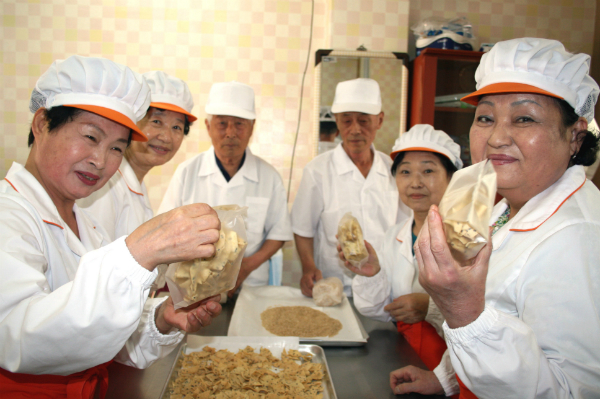 |
||
| ▲ Seniors are working together in the senior club (google) | ||
By 2026, more than 20% of Korean society will be made up of seniors aged 65 years and older. With this fact comes problems such as the increased financial burden on the pension allowance system and the general economic difficulties normally faced by the aged. In order to address these issues, seniors clubs have been created with the goal of job creation for the elderly. Seniors clubs try to assist the aged of every social class gain the necessary new marketable skills to secure further employment.
Moreover, the clubs are also trying to ensure healthy aging for senior citizens through continued participation in economic activities and increased social interaction. There are 125 seniors clubs now in Korea. They help the aged live more energetic lives. So what kinds of activities do they do? They address public interests, education, welfare, manpower dispatching, and market services.
The first job they handle is public interests. Under this task, the elderly are assigned job that improve common services and help communities solve problems within the local community. It consigns useful jobs to address social problems. With this type of activity, the club provides socially isolated seniors with the chance to contribute to public welfare. Moreover, the tasks inspire self-esteem among the aged for their societal contributions when they would have otherwise no special skills to deal with the problems. Furthermore, jobs such as an elementary school meal guide, a library administrator or a subway guide, can be undertaken by the elderly on behalf of local governments thereby reducing administrative expenses.
Education for the elderly in these social clubs is delivering knowledge and experience to the elderly by other senior citizens. This activity grants individuals with an opportunity to contribute to developing senior resources. It provides an independent foundation for the aged. Examples of these opportunities include working as a cultural asset guide, a physical education lecturer or a forest guide.
The welfare aspect of the seniors clubs provides assistance to culturally isolated seniors and supports them in their social adjustment and to live more stable lives. This enhances the pride and emotional stability of senior citizens. There are activities such as taking care of the disabled, supporting multicultural families, and improving their residential environment in the welfare aspect of a seniors club.
The manpower dispatching seniors club identifies those elderly who have a keen business ability and a certain level of education. Senior citizens can earn a stable income and additional earnings. Moreover, the club retrains the aged regularly, so that they may seek stable jobs. Distance ( Think you mean this but not sure.) exam supervisors and dispatching night guards are included in this kind of work.
Finally, the market end of a seniors club manages small enterprises which are suitable for seniors and creates a variety of jobs. This satisfies the need for work for the aged and provides long-term labor and a stable income. Furthermore, these activities prepare the groundwork for senior citizens to free themselves from being otherwise dependent. Under this category, seniors will make and sell food, do parcel service in an apartment or look after local farming.
The Dankook Herald (DKH) interviewed Lee Jong-sung (Head of department, Suwon Seniors Club). First of all, DKH asked why they focus on job creation in the club. He said, “If senior citizens only stay at home, there is a high chance of them suffering from depression. Therefore, the club creates jobs for them to continue to participate in our society.” The national pension program only provides minimal assistance to the elderly upon retirement. It is too small an income to live on, so seniors need to supplement their living expenses. Therefore, another purpose of the seniors clubs is to provide seniors with a supplemental income,” he added.
Secondly, DKH questioned the problem of working with senior citizens and how to overcome the difficulty. He stated, “There are two problems. One is that although the senior job placement project has been in effect for ten years, but people still believe senior citizens can’t work. “The other one is that there is age limit of the working. Additionally, they must work under sixty hours a month,” he added.
Thirdly, DKH asked about a solution to these problems. He answered “The solution is that people have to improve their awareness of the plight of senior citizens. For example, there is no ‘younger job’ usually reserved for young people, although, we so say ‘seniors job’ when referring to jobs for the aged. We have to change this.”
Lastly, DKH asked about the future of seniors clubs. He stated “Job creation for the aged will be revitalized. Moreover, not only will people be working in the interests of welfare for the aged, but also governments and the nation have to try to improve the awareness of work for senior citizens.”
The senior club enhances the nation’s workforce by aiding in creating healthy economic and social activities for senior citizens. Additionally, the club can decrease the burden of further supporting the elderly. For now, seniors clubs lead the aging society by developing various work opportunities for senior citizens. They also help in the re-socialization of the elderly and gradually resolve the problems of our aging society. Moreover, seniors clubs and senior citizens who are working in the club become the new power and the source of our society. By fully understanding this power, our community can become a healthy and sound society, well into the future.
Kang Da-yon, An Hee-jin anhj12261226@gmail.com

![[Campus Magnifier] Let's Surf the Library!](/news/photo/202404/12496_1765_4143.jpg) [Campus Magnifier] Let's Surf the Library!
[Campus Magnifier] Let's Surf the Library!
![[Campus Magnifier] Let's Surf the Library!](/news/thumbnail/202404/12496_1765_4143_v150.jpg)





